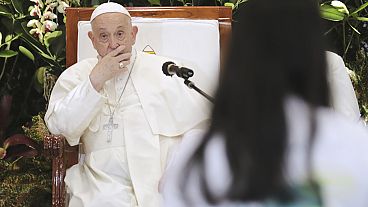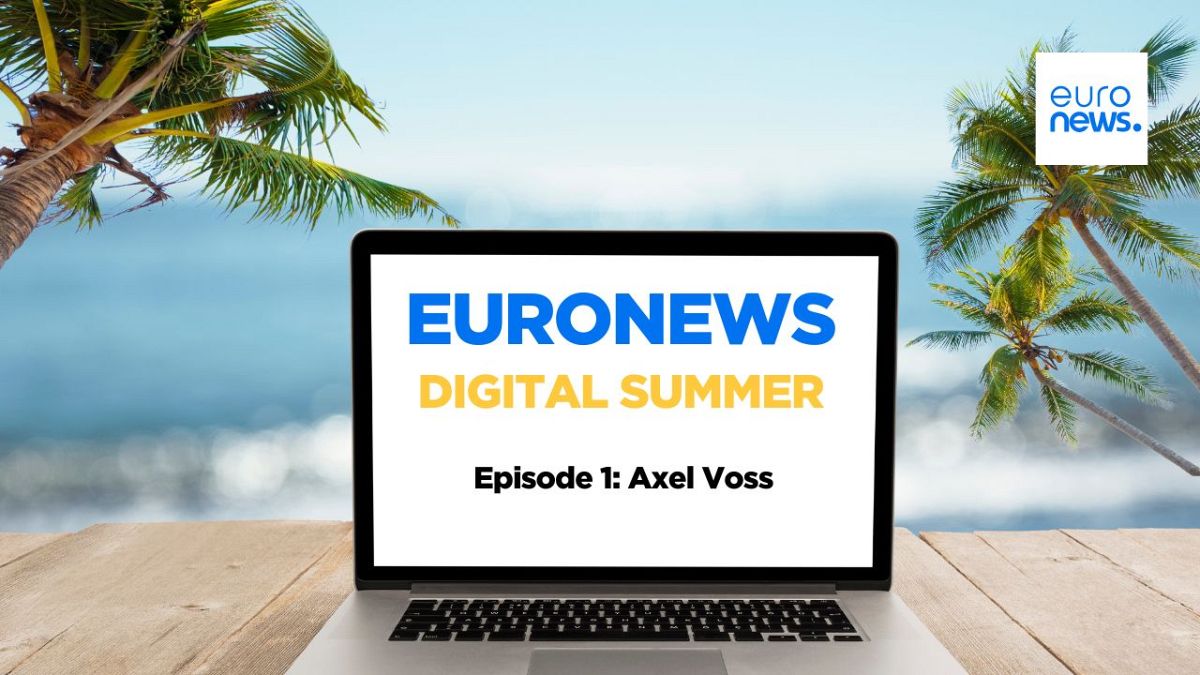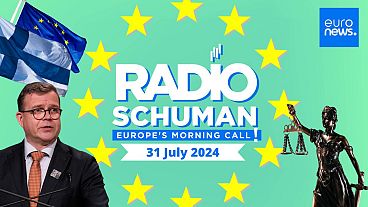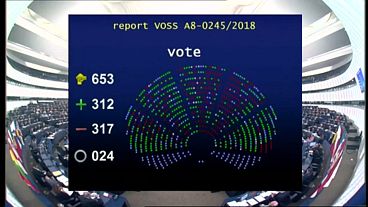The German MEP, in office since 2009, is known for his involvement in tech issues in the European Parliament. He reflects on his experience and the challenges ahead.
The EU should avoid repeating mistakes that happened with the implementation of its copyright directive when enforcing AI, veteran centre-right German lawmaker Axel Voss (EPP) told Euronews in the first of a series of digital themed interviews for the summer.
Over the Parliament's last couple of mandates, Voss has overseen a range of digital files including the General Data Protection Regulation (GDPR), Copyright and AI. Voss also suggested more tailored committees in the Parliament should be equipped to deal with the digital sector, and to preserve Europe's position in world.
Euronews: Congratulations on your re-election, after 15 years in Parliament how has decision-making evolved?
Axel Voss: I believe with more extreme parties here in the house, it might become even more different in this legislative period. If they [the hard right] focus on serious legislative files, then they might suddenly play a different role. So far, they have not taken the whole legislative process very seriously.
From a legislative perspective, I would say it has been getting worse over the years. When I started in the legal committee (JURI), there were serious legal issues, with proper checks and balances with existing laws. In this mandate, even in the serious JURI committee, there are now a lot of activists who no longer see [proposals from] the the dimension of functioning laws.
Euronews: What is so far your proudest moment as an MEP?
Axel Voss: Because of the hurricane in the copyright file five years ago, the majority which I was responsible for, I would say it was a kind of success. However, if you ask the younger generation, they all hate me [for the Copyright Directive]. Probably not as much now, but they still think Article 13* (now Article 17 of the Directive) is breaking the internet. They should know now that nothing major happened, just as I said before, but nobody believed me at the time. [...] Also, in pushing for digital legislation and ideas, I see it as a personal success that I am considered the person for digital files.
*Article 13 of the Copyright Directive holds platforms accountable for the copyright content shared by their users. Concerns about potential impacts on the sharing of memes and GIFs sparked protests. More on the controversy here.
Euronews: Do you think the European Commission was sufficiently ambitious during the last mandate?
Axel Voss: They did a lot regarding digital finance and climate change. We have had the largest number of legislative processes in these areas, even though we also had a COVID-19 pandemic. They were quite ambitious in addressing some digital problems and focusing on fighting climate change. However, where I do not see enough ambition is in digital development itself. They have outlined strategic ideas, but when it comes to executing these strategies, I haven't seen much action.
Euronews: What would be the ideal way for you to regulate the digital sector at European level?
Axel Voss: I would say we should establish “committees for the challenges ahead”: one committee [dedicated to] migration, one dealing with competitiveness and less bureaucracy, and of course for climate change. For digital, it's the same. We need to come forward with a committee on how we can still survive digitally in the world and in this global race. Currently, there are trade, industry, internal market, civil liberties and legal committees all playing a role [on the digital issue]. This is not helpful because everyone is doing something different.
The same applies to the Commission. A lot of DGs are dealing somehow with something digital and probably contradict each other, which results in unclear legislation. This is something that you can avoid if you structure it from the beginning: one digital DG and one commissioner fully responsible for digital.
Euronews: There were also discussions about creating a Commissioner for AI, what are your thoughts on it?
Axel Voss: What we have to avoid and what we shouldn't do at all, is to create the same problems as with the GDPR, when we are giving the Member States the chance to interpret all the rules on their own. Only in cross-border cases, we are coming to full harmonization of elements of it, but this takes years and we shouldn't start with AI in such a way. Therefore, we need kind of a strong AI office leading the AI development when it comes to interpretation, overlapping of laws.
There are some missing pieces in AI legislation like the situation with generative AI and the enforcement of individual rights, copyrights and so on. This we must solve, so I hope that in this transition period we have the possibility to start with a complement to the AI Act.
Euronews: Do you foresee a revision of GDPR?
Axel Voss: I am in favour of a revision of the GDPR, but in reality it might come to very specific corrections, not in a general way that I would like to see. My left-wing orientated friends in the house should be more open to integrate more, like the e-privacy* dimension which has been in deadlock for seven years.
We can modernise the GDPR. Of course, but to renew the whole structure, you have to have a majority. Therefore I would like to change the structure in saying you can use all data you want, [so long as you don't] touch the privacy of my citizens.
*E-privacyis the online privacy law of the EU. It entered into force in 2002 and was last amended in 2009. Since 2017 the European Commission has been trying to revise the law but negotiations have stalled due to disagreements between MEPs and EU member states.
Euronews: Do you observe an evolution in the way lobbying is being done?
Axel Voss: I find complaints about lobbying incorrect. Without exchanges with those who have to deal with the law, we wouldn’t always know, especially in digital matters, how they handle these issues or what the practical structures are. That’s why I believe we need their [lobbyists'] experience in digital dimensions, because we are not experts in digital processes.
I know some of my, let's say, left-wing oriented friends here in the house focus only on lobbying by NGOs. For me, it's different—I talk to them if they are interested in talking to me, but I don’t know who is funding them or what interests they represent. They come up with wonderful ideas about protecting fundamental rights, the environment, and so on. However, these initiatives could be funded by, let’s say, one of the big tech companies that are against the law but are trying to push interests through a new approach.
If you have experienced lobbying in copyright, all other lobbying doesn’t really compare. There is some intense lobbying in data protection as well. When it comes to the due diligence file, we need to take the time for bilateral approaches. We invited around 200 interested associations and companies, sat with them for two hours, and asked about their problems and opinions. This is intensive, yes, but I would say it’s just part of the process.















